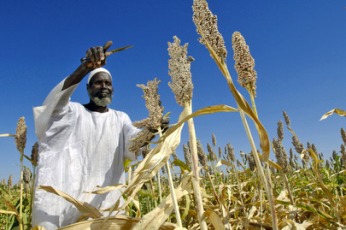Saudi Arabia to cultivate immense territory in eastern Sudan
June 20, 2016 (KHARTOUM) – Sudan’s Ministry of Water Resources and Electricity on Monday said that Saudi Arabia will cultivate one million feddans in Upper Atbara and Setait project in East Sudan, which will be inaugurated at the end of the year.

Last April, Sudan said it will inaugurate a Saudi project to cultivate one million feddans in July.
The feddan is a unit of area equivalent to 1.038 acres (0.42 ha).
Upper Atbara and Setait Project, which is funded by Gulf financial institutions, aims to generate 150 Megawatts of power and provides irrigation water sufficient to cultivate one million feddans.
The framework agreement obliged the two parties not to disclose any information related to project to a third party and that the provided information should be used for requested purposes only.
While deliberating on the agreement, some Members of Parliament (MPs) objected to the length of time for the project. They called to reduce it to 20-25 years and suggested to renegotiate the contract at the end of its term.
Also, the lawmakers criticized a clause providing to keep confidential the agreement and its terms, saying this confidentiality could jeopardize the rights of the landlords.
Nonetheless some MPs defended the framework agreement between Sudan and Saudi Arabia grounding that the saying the land of the project has not been utilized in the past 900 years.
The Minister of Water Resources and Electricity, Mutaz Musa, said the scheme is a long term investment because it is owned by governments and not individuals.
He said that the first ten years of the project will be dedicated for constructing infrastructure and the second ten years will be for land restoration.
“States cannot take the risk to invest in a 25-year project. The short term project can cause damage to the investors. Also, the clause of confidentiality intends to protect the content of the contract on the regional level and not directed against the citizens,” he said.
The minister pointed out that the project would renew confidence in the Sudanese product, adding, that “a partner like Saudi Arabia will guarantee the marketing of our products .. because of the economic blockade deprives us from marketing what we produce.”
Concerning the details of the project, the minster said Sudan will provide lands and authorizes Saudi Arabia to utilize irrigation water for the crops recommended by the feasibility study. While Saudi Arabia will cover the $10 billion infrastructure cost.
He stressed that Saudi Arabia will link its food security with Sudan from now onwards.
In November 2015, Sudan and Saudi Arabia signed in Riyadh four agreements that include a framework agreement to fund Kajabr, al- Sharik and Dal dams in northern Sudan and an agreement to cultivate one million feddans in Upper Atbara and Setait.
Previously, Sudan expected that Saudi investments in the country will rise to $15 billion in 2016 compared to $11 billion in 2015.
(ST)
